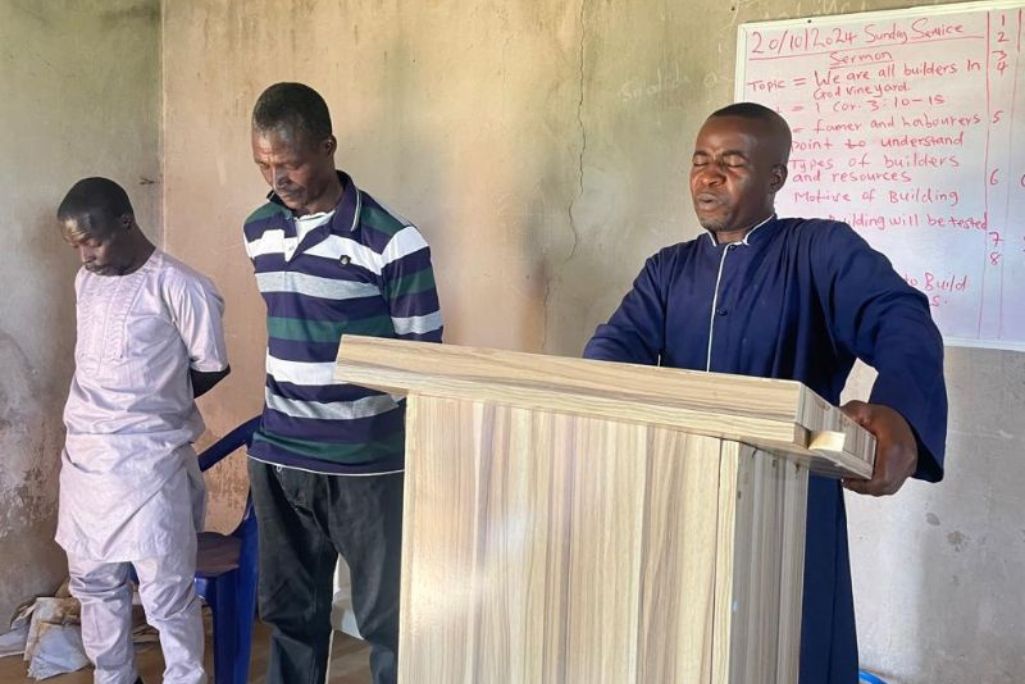
Eli Abdullahi Tinau, pastor of Evangelical Church Winning All in Nkiendoro, Bassa County, Nigeria, risks his life to share the gospel with Fulani Muslims amid increasing violence from militant Fulani.
(EDITOR’S NOTE — Sunday, Nov. 3, is the Day of Prayer for the Persecuted Church.)
PLATEAU, Nigeria (BP) — Pastor Eli Abdullah Tinau lives in the charred room that remains of his home after an attack by militant Fulani Muslims, an increasingly violent group accused of killing thousands of Christians in middle and northeastern Nigeria.
But Tinau, a Fulani Christian who converted from Islam, is committed to sharing the gospel with Fulani Muslims as a missionary and pastor of Evangelical Church Winning All in Nkiendoro, about 60 miles from Jos in the Bassa Local Government Area, International Christian Concern (ICC) reported.
“I expect persecution because I am no longer of this world,” ICC quoted Tinau days before Southern Baptists and other Christians worldwide mark the Day of Prayer for the Persecuted Church Nov. 3. “I hold firm to my faith in Christ.”
Militant Fulani have killed more Christians in Nigeria in the past four years than Boko Haram and the Islamic State West Africa Province (ISWAP) combined, according to a report from the Observatory for Religious Freedom in Africa (ORFA), a research, training and advocacy program promoting religious freedom on the continent. ORFA terms the Fulani terrorist group the Fulani Ethnic Militia (FEM), which includes a mix of armed Fulani herdsmen, Fulani bandits and others.
For years, Christians in Nigeria have complained of attacks by militant Fulani without adequate response nor protection from Nigeria’s government.
“Millions of people are left undefended,” ORFA Senior Analyst Frans Vierhout said upon the release of the data in August. “For years, we’ve heard of calls for help being ignored, as terrorists attack vulnerable communities. Now the data tells its own story.”
FEM killed at least 42% of all civilians killed in community attacks, while Boko Haram and others combined killed 10%, contends the report, “Countering the Myth of Religious Indifference in Nigerian Terror,” which spans October 2019 through September 2023.
Among 55,000 killed by terrorists in Nigeria in the study period, ORFA counted 30,880 civilian deaths, including 16,769 Christians, 6,235 Muslims, 154 African Traditional Religionists and 7,722 whose religion was not known.
In its 2024 World Watch List, persecution watchdog Open Doors lists Nigeria as the most dangerous place for Christians to live.
In September and October alone, Fulani militants are blamed for the deaths of at least 36 Christians in Nigeria’s middle belt, Church in Chains reported Oct. 17. And on Oct. 26, FEM attacked a Benue community during ongoing peace talks, killing two, injuring one and torching several homes that had withstood previous attacks, Truth Nigeria reported Oct. 28.
The FEM attack, the fifth on the community since June, occurred in the middle of the afternoon during a Peace and Security Meeting convened by a delegation of Fulani and representatives of Agatu Local Government Area, as well as representatives of the Igala and Ibira ethnic groups from Kogi and Nasarawa State, Truth Nigeria reported.
Many times in Nkiendoro, Tinau has come close to being a victim of Fulani militants, ICC reported. Terrorists have confiscated his livestock, robbing his family of their livelihood as he and his wife continue their education — he in seminary and she at the National Teachers Institute. The couple can afford to send only one of their daughters to school.
Tinau has seen fruit in his ministry, bringing two Fulani to Christ, ICC said.
“I will never go back to Islam,” Tinau said. “Christ has not compromised. I will not compromise. I will continue to preach and bring additional souls to Christ.”
Tinau is among many persecuted Christians the International Mission Board is encouraging Southern Baptists to remember in prayer Nov. 3, with resources available here.
(EDITOR’S NOTE — Diana Chandler is Baptist Press’ senior writer.)


